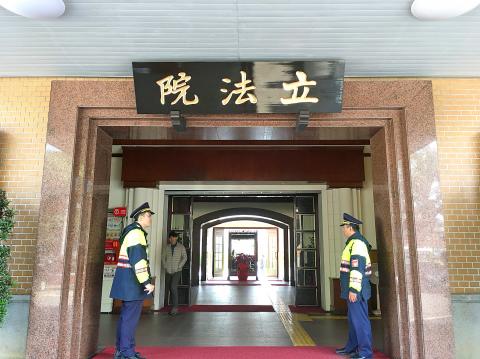Lawmakers are slated this week to vote on a proposed amendment that would ban high-ranking officials and military officers from attending official events in China that are deemed injurious to Taiwan’s national dignity.
The third reading of proposed amendments to the Act Governing Relations Between the People of the Taiwan Area and the Mainland Area (臺灣地區與大陸地區人民關係條例) could begin as early as Wednesday, Democratic Progressive Party (DPP) caucus whip Ker Chien-ming (柯建銘) said yesterday.
The DPP lawmakers have reached broad agreement over regulatory issues, including property rights, income tax, import excises and returning Taiwanese enterprises, with legal drafts more or less “settled” since June 21, he said.

Photo: Lin Liang-sheng, Taipei Times
However, the draft amendment banning former high-ranking officials from attending Chinese state events is undergoing revision, he said.
In the original proposal, such officials would be allowed to take part in Chinese state events if they have been retired for at least 15 years, but DPP lawmakers feel the restriction is inadequate and should be changed to a lifetime ban, he said.
DPP legislators have achieved “a high degree of consensus” on the issue and the caucus is in the process of incorporating the lifetime ban in the draft, which is being coordinated and finalized with Premier Su Tseng-chang (蘇貞昌), he said.
DPP Legislator Lee Chun-yi (李俊俋) was responsible for the motion to strike out the 15-year limit, which DPP lawmakers Rosalia Wu (吳思瑤) and Kuo Kuo-wen (郭國文), and Mainland Affairs Council Minister Chen Ming-tung (陳明通) supported.
“There should be no tolerance for behavior that brings disgrace to the country, no matter how long an official has been retired for,” Lee said.
The bill, in its current form, applies restrictions to retired officials with the rank of deputy minister or above, whose work involved defense, national security, foreign affairs or China; and retired officers with the rank of lieutenant general or above.
The proposed amendment to the bill would forbid gestures in honor of symbols representing the Chinese state or the Chinese Communist Party (CCP), or participation in events held by the Chinese government, its leaders, military, intelligence or administrative apparatus, or its political affiliates.
Penalties for contravening the proposed amendment range from the deprivation of a pension or a fine of no more than NT$5 million (US$160,917) for those not receiving a pension.
In a bid to counter Chinese espionage and influence campaigns in Taiwan, DPP lawmakers have passed numerous national security bills, including amendments to the National Security Act (國家安全法) on June 19 that impose a minimum sentence of seven years for Chinese spies and raise the maximum fine for the crime to NT$100 million.

Beijing could eventually see a full amphibious invasion of Taiwan as the only "prudent" way to bring about unification, the US Department of Defense said in a newly released annual report to Congress. The Pentagon's "Annual Report to Congress: Military and Security Developments Involving the People's Republic of China 2025," was in many ways similar to last year’s report but reorganized the analysis of the options China has to take over Taiwan. Generally, according to the report, Chinese leaders view the People's Liberation Army's (PLA) capabilities for a Taiwan campaign as improving, but they remain uncertain about its readiness to successfully seize

Taiwan is getting a day off on Christmas for the first time in 25 years. The change comes after opposition parties passed a law earlier this year to add or restore five public holidays, including Constitution Day, which falls on today, Dec. 25. The day marks the 1947 adoption of the constitution of the Republic of China, as the government in Taipei is formally known. Back then the Chinese Nationalist Party (KMT) governed China from Nanjing. When the KMT, now an opposition party in Taiwan, passed the legislation on holidays, it said that they would help “commemorate the history of national development.” That

HORROR STORIES: One victim recounted not realizing they had been stabbed and seeing people bleeding, while another recalled breaking down in tears after fleeing A man on Friday died after he tried to fight the knife-wielding suspect who went on a stabbing spree near two of Taipei’s busiest metro stations, Taipei Mayor Chiang Wan-an (蔣萬安) said. The 57-year-old man, identified by his family name, Yu (余), encountered the suspect at Exit M7 of Taipei Main Station and immediately tried to stop him, but was fatally wounded and later died, Chiang said, calling the incident “heartbreaking.” Yu’s family would receive at least NT$5 million (US$158,584) in compensation through the Taipei Rapid Transit Corp’s (TRTC) insurance coverage, he said after convening an emergency security response meeting yesterday morning. National

Taiwan has overtaken South Korea this year in per capita income for the first time in 23 years, IMF data showed. Per capita income is a nation’s GDP divided by the total population, used to compare average wealth levels across countries. Taiwan also beat Japan this year on per capita income, after surpassing it for the first time last year, US magazine Newsweek reported yesterday. Across Asia, Taiwan ranked fourth for per capita income at US$37,827 this year due to sustained economic growth, the report said. In the top three spots were Singapore, Macau and Hong Kong, it said. South